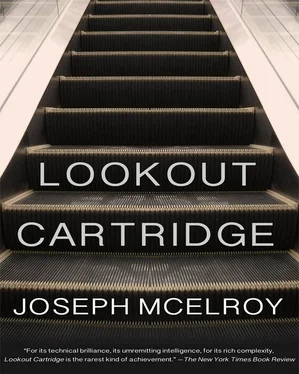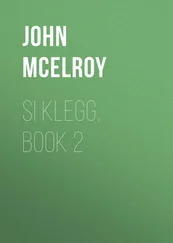Joseph McElroy - Lookout Cartridge
Здесь есть возможность читать онлайн «Joseph McElroy - Lookout Cartridge» весь текст электронной книги совершенно бесплатно (целиком полную версию без сокращений). В некоторых случаях можно слушать аудио, скачать через торрент в формате fb2 и присутствует краткое содержание. Год выпуска: 2014, ISBN: 2014, Издательство: Dzanc Books, Жанр: Современная проза, на английском языке. Описание произведения, (предисловие) а так же отзывы посетителей доступны на портале библиотеки ЛибКат.
- Название:Lookout Cartridge
- Автор:
- Издательство:Dzanc Books
- Жанр:
- Год:2014
- ISBN:9781941088036
- Рейтинг книги:3 / 5. Голосов: 1
-
Избранное:Добавить в избранное
- Отзывы:
-
Ваша оценка:
- 60
- 1
- 2
- 3
- 4
- 5
Lookout Cartridge: краткое содержание, описание и аннотация
Предлагаем к чтению аннотацию, описание, краткое содержание или предисловие (зависит от того, что написал сам автор книги «Lookout Cartridge»). Если вы не нашли необходимую информацию о книге — напишите в комментариях, мы постараемся отыскать её.
Lookout Cartridge — читать онлайн бесплатно полную книгу (весь текст) целиком
Ниже представлен текст книги, разбитый по страницам. Система сохранения места последней прочитанной страницы, позволяет с удобством читать онлайн бесплатно книгу «Lookout Cartridge», без необходимости каждый раз заново искать на чём Вы остановились. Поставьте закладку, и сможете в любой момент перейти на страницу, на которой закончили чтение.
Интервал:
Закладка:
I told the blind man I’d stop by again if I was in the area if he didn’t mind and he said he did-and on the point of remembering what Jenny had asked me to bring back this trip, I set out again. But there were cloudy screens at many distances and all around in more directions than Gotham’s old grid seems to permit, and I myself a projection out of focus unless aimed at the right screen.
An oriental with a good camera snapped a dozen pictures from curb to curb crossing Park at Fifty-second and kept snapping even after a car honked him into a jump shot that I stepped back out of.
If I didn’t get to the charter man, I was still less than twenty-four hours past that twilight holding-pattern at Kennedy and if this throbbing horizontal gravity kept me from getting uptown to see the charter man today, I still had two or three weeks.
I could not know naturally that today was not the day I was going to be shoved down a dead escalator, as if some private-spirited mechanic at wit’s end were trying to prime those stopped steps with living feet. I couldn’t know for sure that Jim and Claire weren’t linked — hell, the people you know tend to do the same things as you — in New York you see a French bloke you haven’t seen in three years suddenly in the lobby at a festival of horror films contemplating popcorn through the glass counter, his hand detached below a leather sleeve; or in London at the end of a bad day you catch an Arts Council Show and in the first of its series of American interiors you sit down in a Vegas madam’s 1943 parlor that’s traveled from California to Germany and now here to London on the way back home and you listen to the authentic jukebox and you cross eyes with a blue-uniformed guard who looks away as you wonder if he ever heard “Don’t Fence Me In” during the Blitz, but now at eyelevel from Roxy’s seedy armchair where you’re sitting two new knees materialize and they turn out to be knees that followed yours at the Cinderella Ball in Brooklyn Heights a year later in ’44, for you move up past them to a Lincoln green wool hem and thence in a rush to Renee’s russet shag that is not russet now but hot San Francisco copper: Reneé—for Christ sake Renée -opens her bright mouth, moans, and reaches at you and as you incredulously get up almost falls into your lap there in the easy chair of your traveling brothel but a moving lap is hard to find and as Renee says quite loud, Missed it in L.A., had to see it here, the russet hair you mouthed on Brooklyn Heights flies back in your face here half a mile from Buckingham Palace at this summer show (where in Days of old, Knights were bold) and the same low-pitched voice you once kissed gives you a twenty-five-year résumé and when the Crosby changes in the bright dome of this jukebox that transcends nickles and dimes, the mouth takes a breath, its breasts rise, and it asks where you’re staying — and you don’t know where to start, here in Merry England, where Knights were bold and ladies not particular. You shrug (as if amused): I’m making a film — and she says, Oh you’re on location, and you say, No I mean I live here. She says, We’re going to Stratford tomorrow, and you say be sure and go over to Warwick Castle to see the peacocks.
What’s your film called? she says, and when you ask for ideas she says, Murder in Murmansk.
Where does time pass on a day in New York? Is that what my eyes were bucking? all that time-waste recycled as dirty air thus dense enough to be like the looking glass in some tale I read Jenny who was then Ginny in which if you wish you can see what’s happening somewhere else? I walked east and south and east again, I was between the first opening which had been mine and the next which had to be Outer Film’s.
I had cut back to Goody’s record store. I was shot at the entrance by a toy pistol that fired actual wooden cartridges. Down stairs I found the section and looked for the M’s. One of the big bands was into a fox trot of “I Remember You” but got rejected, and in the lesser noise of voices speaking, a German accent with the authority of a root canal specialist was lecturing a customer: Keep then your monaural but you ruin your stereo records if you don’t buy a stereo pickup. The customer was saying something, but now a crash of strung steel covered the ceiling and at once lowered itself upon us like a lid drummed by our own ears at a 4–8 shake tempo so established that the group seemed to have been playing sound-proofed till some Goody employee hunting a disc opened their door. This siege of feeling may have been the Stones, I didn’t ask, but Jenny gets Rolling Stone , and between the instants at which I spotted the dark blue edge of Lorna’s album Blue and put my fingers on it and drew out the bluegloamed face, I knew again that all my daughter had asked me to bring her back was a goddarnned memory, she’d come upon the words Monday night while Lorna was upstairs packing for me. A farewell dispute — and Jenny knew her words bring me back a memory orphaned her in my eyes and lessened me. We had more than an argument. It was the first time Jenny — christened Virginia, called by us Ginny, changed by her to Jenny — hadn’t asked me to bring her something from the States and I gave myself so little leeway I pressed her hoping to calm her, but she held on to a signal she’d found in her just-uttered words, yet now not with a very young woman’s clear, spiky sex but a late adolescent girl’s subtler uncertainty as to how much she might have to hurt herself: as if the five words she’d come upon in cruel delight — bring me back a memory —had become a venture she must see through. Then with a friendliness I didn’t like she said, You and that film.
You can’t help, I said.
If I could only get away to my plane and to New York Jenny would be safer in London free of this nonsense about postponing A-levels and taking a job in San Francisco, where she’d never been, or New York, which she stuck in only so I’d think of her seeing her grandparents.
I paid Goody’s by check using an old Shell credit card and a New York driver’s license in whose fold a snap of Will had got stuck. The woman took card, license, and picture, turned my check over onto the cash register’s little counter, poised her pen and asked me my address as if she’d forgotten it, and I automatically gave Sub’s, the one on the license. Will had on a bikini and below his snorkel mask his mouth was grinning.
Back on Third I bought a pack of absorbent rings which give off sandalwood scent when the light bulbs they fit onto are lighted. How near the Outer Film office was I; I got out my wallet, my Manhattan address-locater, and as I finished dividing the first three figures by 2 and subtracting 12 for Avenue of the Americas I was accosted by a heavy-set black man in a lumpy overcoat and no socks who asked me for a dollar, and when I automatically said, Sorry I don’t have any change, he looked at my address-locater torn from some host’s Yellow Pages long ago, his hair was cropped close to his skull, he shrugged and I felt I had earned him his dollar and in the breeze carefully took it out of my wallet and handed it over. He didn’t thank me and as I looked at his splayed nose I got a spread of adrenalin in my face: I hadn’t paid Myrna the eighteen ten.
He said, Don’t go too far downtown, man, the wind is blowing the high buildings and they got these flakes of asbestos coming down like first snow.
I asked if he knew that at Mt. Sinai they’d found asbestos in someone’s uterus. His eyes followed my address-locater back into my wallet and he said, I believe you, man, that’s the important thing. Hard-hat fell thirty floors, you hear? I just got into town, I said, I’ve been away. I believe you, man, so you didn’t read it in the papers — fell thirty floors through a steel grate, some other cats are standing there but this hard-hat he just went right through, nothing left on the platform, only his helmet, right?
Читать дальшеИнтервал:
Закладка:
Похожие книги на «Lookout Cartridge»
Представляем Вашему вниманию похожие книги на «Lookout Cartridge» списком для выбора. Мы отобрали схожую по названию и смыслу литературу в надежде предоставить читателям больше вариантов отыскать новые, интересные, ещё непрочитанные произведения.
Обсуждение, отзывы о книге «Lookout Cartridge» и просто собственные мнения читателей. Оставьте ваши комментарии, напишите, что Вы думаете о произведении, его смысле или главных героях. Укажите что конкретно понравилось, а что нет, и почему Вы так считаете.












